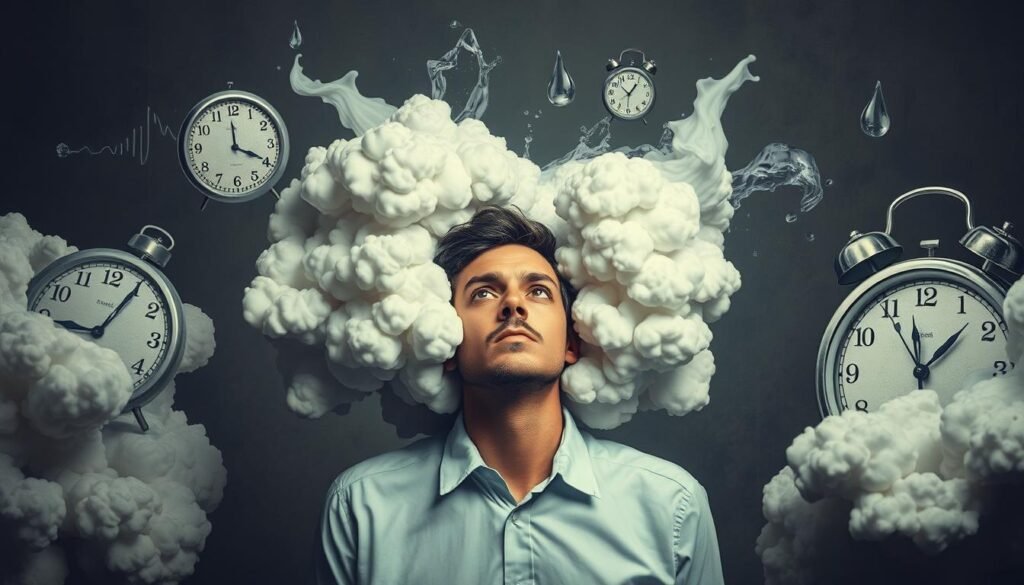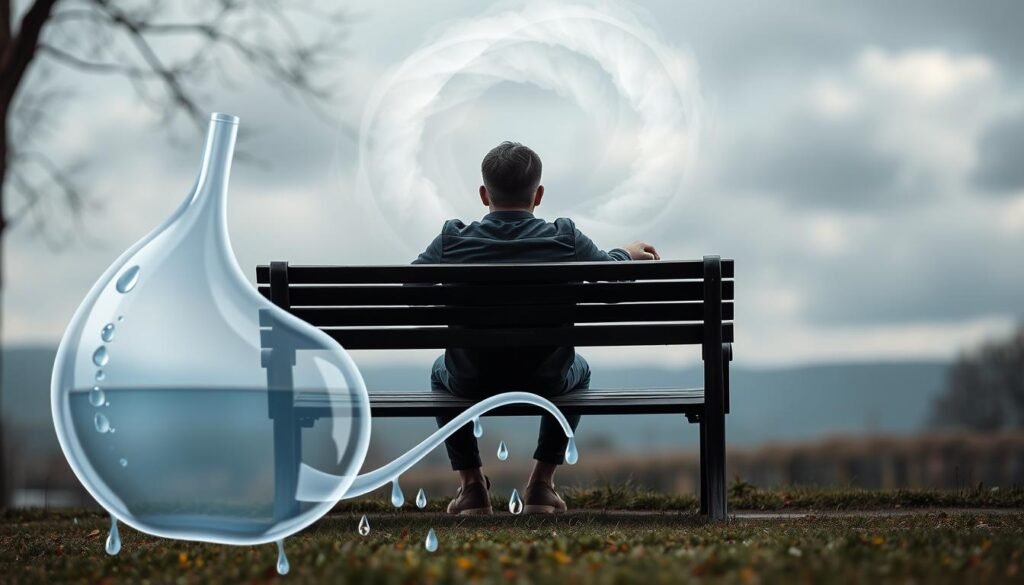Did you know that about 50% of people with overactive bladder (OAB) feel anxious too? This important fact links mental health to how often we need to pee. Many ask: does being anxious make you pee more? To understand, we should know how anxiety and peeing often are connected. It shows how our feelings can affect our body. This article will shed light on this topic. It will explain how anxiety influences our peeing habits.
Key Takeaways
- Anxiety affects about half of people with overactive bladder (OAB).
- Frequent urination can be linked to muscle tension caused by anxiety.
- Fear responses can trigger instant urination during stressful situations.
- Managing anxiety can alleviate urinary issues related to mental health.
- Relaxation techniques may help reduce anxiety-related frequent urination.
- Chronic anxiety treatment is vital for those experiencing excessive urination.
Understanding Anxiety and Its Symptoms
Anxiety is a complex feeling affected by various things. It could be due to environmental stresses or how a person is built. It’s key for people to understand anxiety’s symptoms. These symptoms greatly affect a person’s mental health. Symptoms include feelings of restlessness, a fast heartbeat, and physical tightness. These might not seem linked to daily activities but can cause problems in many life areas.
Anxiety can cause several physical reactions. For example, it can make the body release stress hormones like adrenaline. This can make the kidneys work more and cause more urine production. This starts a tough cycle of symptoms. Understanding anxiety helps in dealing with emotional and physical pain. Research shows nearly half of the people with overactive bladder also have anxiety. This shows a strong connection between the mind and body.
Knowing the symptoms of anxiety can help in finding ways to deal with it. Using therapy, being mindful, or getting medical help can really improve things. In fact, treatments such as behavioral therapy have improved not just bladder issues but also the quality of life for many.
How Anxiety Can Affect the Body
Anxiety impacts our health in many ways, leading to physical effects of anxiety. It goes beyond feeling stressed, causing changes in how our body works. For example, muscle tension often occurs in the neck and shoulders. This is because our body reacts to stress. It shows how our mind and body are closely linked.
Feeling constantly tired is another sign of anxiety. People may struggle with everyday tasks because of this fatigue. This tiredness comes from our body’s ongoing stress response. It wears us out over time. Anxiety can also make bladder problems worse, like Overactive Bladder (OAB). Studies show that anxiety is linked to OAB. It can make the body’s inflammation worse, causing more bathroom trips.
Research shows that more than 26% of people with OAB also deal with anxiety. This rate is higher compared to other urinary issues. This suggests anxiety makes people more prone to bladder problems. Stress from OAB can make things even tougher, especially for women, who are more likely to have anxiety disorders. It’s important to understand these signs of anxiety. They can be especially crucial for those with bladder issues.
Building healthy habits around managing bladder health can help. Besides treatment, knowing how your body reacts to stress is key to coping better.
Does Anxiety Make You Pee More? The Science Behind It
Understanding why anxiety makes some people pee more is simple. Stress leads to hormone surges that affect the bladder. This reaction makes you feel an urgent need to pee because of anxiety.
Anxiety’s link to peeing a lot involves both body and mind. It affects how you control your bladder.
The Connection Between Anxiety and Urinary Frequency
Anxiety makes your body more sensitive, even to the need to pee. Stress triggers your brain to release a hormone that makes your bladder contract. This is why you might feel the need to pee more when anxious.
This shows how closely mental health and peeing can be connected. It answers the question, does anxiety increase how often you pee?
Anxiety-Related Urinary Urgency Explained
People with anxiety may feel the need to pee often, even if their bladder isn’t full. Anxiety can cause symptoms like those of an overactive bladder. To help, things like pumpkin seeds and practicing yoga can reduce these symptoms.
It’s crucial to tackle the mental health part too for better bladder function. For anxious folks, less caffeine and alcohol helps with bladder issues. Learning how to manage stress can improve your situation a lot.
Immediate Urination Responses to Anxiety
The body may respond to anxiety by feeling a strong need to urinate. This happens because of the body’s fight-or-flight response. It chooses survival over functions like holding in urine. This urge is normal when faced with stress or fear.
Anxiety can make the kidneys produce more urine. This makes people need to go to the bathroom quickly. Techniques like belly breathing can help calm these feelings. Cognitive behavioral therapy (CBT) is also useful for managing anxiety and bladder issues.
Strengthening pelvic muscles and reducing caffeine intake can also help. These steps improve bladder control during stress. For ongoing problems, seeing a urologist might be necessary. They can check for things like an overactive bladder.

The Role of the Fight or Flight Response
The fight or flight response is key in how our bodies handle threats. When we feel anxious, our body gets ready to face or flee from danger. This response sets off physical changes, leading to anxiety symptoms like muscle tightness and changes in how our bladder works.
How Anxiety Triggers Physical Reactions
Anxiety kicks our sympathetic nervous system into action. This releases stress hormones, such as cortisol. Being exposed to these hormones for too long can harm our bladder, causing symptoms like needing to go often.
This focus on survival makes other body functions take a back seat. This can cause muscle tightness and affect how the pelvic floor works, messing with bladder control when we’re stressed.
Many people deal with the need to urinate more often, especially when stressed. Relaxation methods like deep breathing and meditation can help. They reduce the fight or flight response’s effect on the bladder.
The link between anxiety and bladder health is crucial for our overall well-being. Products like Jude’s Bladder Strength Supplement can help improve bladder control in a natural way. They offer support in stressful times. Knowing how anxiety and bladder health affect each other can help us manage both better.
| Physical Reaction | Explanation | Impact on Bladder Function |
|---|---|---|
| Muscle Tension | Increased tension can disrupt normal pelvic floor function | May lead to urgency and frequency |
| Increased Heart Rate | Body preparing for quick action | Can trigger rapid bladder contractions |
| Cortisol Release | Prolonged stress response affects various bodily functions | Linked to overactive bladder symptoms |
| Anxiety Symptoms | Parauresis or shy bladder syndrome may develop | Struggles with urination in social settings |
| Relaxation Techniques | Methods such as deep breathing can alleviate tension | Helps to reduce the urgency sensation |
Common Causes of Anxiety-Related Frequent Urination
Anxiety affects our bodies in many ways, including making us pee more often. Understanding why anxiety makes us need to urinate frequently can help us deal with it better. Things like muscle tension and how humans have evolved play big roles in frequent urination.
Muscle Tension and Its Effects
Anxiety causes muscle tension, leading to more pressure on the bladder. When we get anxious, our pelvic muscles get tight. This can make us feel like we have to pee a lot.
With muscles squeezing the bladder, our body might think it’s time to pee. This is how anxiety can lead to needing to urinate more.
The Evolutionary Perspective on Urination
Looking back, frequent peeing during stress had a survival benefit for early humans. Being lighter made it easier to run from danger. This reaction to stress and urination is part of our biology.
It shows how our bodies adapted over time. Thinking about it this way helps us understand anxiety-related frequent urination better.
Anxiety Symptoms and Increased Urination
Anxiety and increased urination can happen together when you’re very stressed. Studies show that stress, anxiety, and depression might cause problems like overactive bladder and loss of bladder control. This shows how feelings can affect how your body works.
Stress can make you feel like you need to pee more often. Being stressed for a long time can make this worse. Feeling nervous before something stressful can also make you want to pee more. It’s important to know this to understand how anxiety impacts health.
To manage these symptoms, there are several options. Pelvic floor exercises help strengthen muscles for better bladder control. Also, cognitive behavioral therapy (CBT) changes how you think about peeing. Techniques for mindfulness and relaxing can also help your bladder.
Eating the right foods is also key in reducing stress and anxiety. Adding B vitamins, Vitamin D3, magnesium, and omega-3s to your diet can help. Herbs like chamomile, valerian root, and ashwagandha are also good. Joining support groups offers extra help and encouragement from others who understand.
| Treatment Options | Benefits |
|---|---|
| Pelvic Floor Exercises | Strengthen bladder control muscles |
| Cognitive Behavioral Therapy (CBT) | Reshape negative thought patterns |
| Mindfulness Techniques | Promote overall relaxation |
| Nutritional Support | Reduce anxiety symptoms |
| Joining Support Groups | Provide community and advice |
Anxiety and Overactive Bladder: What to Know
Anxiety and overactive bladder affect urinary health in many ways. People with overactive bladder feel a sudden urge to go to the bathroom. This can make them feel shy and limit activities with friends or family. The need to urinate often can also make their anxiety worse. This forms a tough cycle to break.
Overactive bladder symptoms include urgent needs, leakage, and waking up at night to go. It’s not just due to getting older. This issue can happen at any age and may be linked to menopause or other health conditions.

Overactive bladder can come from different causes, including diet and stress. Anxiety can make these symptoms worse by making muscles tense. It’s key to know when anxiety is causing your symptoms. Knowing this helps find the best way to deal with them.
To manage an overactive bladder, you might need to change your lifestyle or get medical help. Doing pelvic floor exercises, eating differently, and planning bathroom visits can help. Sometimes, medicines like anti-muscarinics or mirabegron are needed. For more help with anxiety and overactive bladder, talking to a professional or trying therapy is good.
Being active in improving your physical and emotional health can make things better. It leads to healthier bladder control and a happier life.
Assessing the Relationship Between Anxiety and Urinary Incontinence
The link between anxiety and urinary incontinence is now more recognized. Anxiety can cause involuntary leakage. This creates a challenging cycle that impacts both mind and body. Involuntary urination often comes from increased stress, which is common in anxiety disorders.
Chronic stress may lead to constant urinary urgency. This condition means you suddenly need to urinate often. It can become a more severe problem known as overactive bladder (OAB). Stress and worry about leaking can make incontinence worse.
Research finds up to 30% of men and 40% of women in the U.S. have OAB symptoms. Those who find it bothersome see their quality of life drop. They also notice less productivity at work. Anxiety disorders are linked to a greater chance of having OAB symptoms. This shows a close link between bladder control and mental health. For more details, click here.
Understanding the importance of self-awareness in managing these issues is key. If you have anxiety-related urinary incontinence, talking to healthcare professionals is a smart step. Strategies like cognitive-behavioral therapy, mindfulness, and counseling can help manage symptoms.
| Condition | Common Symptoms | Impact on Quality of Life |
|---|---|---|
| Anxiety Disorders | Persistent worry, panic attacks, anticipatory anxiety | Low productivity, social withdrawal, increased stress |
| Overactive Bladder (OAB) | Frequent urination, sudden urges, incontinence | Low quality of life, sleep disturbances, emotional distress |
| Incontinence | Involuntary leakage, urgency, need for frequent restroom visits | Impact on daily activities, social embarrassment, decreased confidence |
How Anxiety Affects Bladder Control
Anxiety impacts many body functions, including how we control our bladder. People often notice their urination patterns change when they’re stressed. Understanding this connection helps us see how our mental and urinary health are linked.
Understanding the Impact on Urination Patterns
Long-term stress can change how often we need to urinate. It might cause urinary incontinence, UTIs, and bladder stones. Research shows that stress and overactive bladder symptoms are connected. Anxiety can make us need to pee more, causing a constant urge to go. This situation can make anxiety worse, becoming a tough cycle to break.
Stress affects more than just our body. It can mess with how well we sleep, making us wake up a lot. Being tired all the time can lower our quality of life. The worry over bladder issues can make us tense up in places like our pelvic floor. This tension can make bladder problems worse.
Practices like mindfulness can help with bathroom-related anxiety. Cognitive-behavioral therapy and regular exercise also improve bladder control and mental health.

Looking for help? Products like Jude’s Daily Support Supplement could lessen leaks. Combining the right treatments and lifestyle changes can help manage anxiety’s effect on peeing. This way, people can take back control over their bladder health.
Ways to Manage Anxiety-Related Urinary Issues
Anxiety can cause several uncomfortable symptoms, like urinary problems. Learning to handle these issues is key for good health. Using relaxation techniques helps relieve symptoms. Getting professional help for anxiety tackles the root causes.
Relaxation Techniques to Help Alleviate Symptoms
Relaxation methods are crucial for dealing with anxiety and urinary troubles. Here are some helpful techniques:
- Belly breathing: It relaxes the nervous system and lessens stress.
- Mindfulness meditation: It grounds you and lowers anxiety.
- Yoga: Besides relaxing, it strengthens bladder control muscles.
Adding these techniques to daily life eases urinary issues and helps mentally.
Seeking Professional Help for Anxiety
If anxiety or urinary problems persist, professional guidance may be needed. Both cognitive behavioral therapy (CBT) and dialectical behavioral therapy (DBT) are effective. Duloxetine (Cymbalta) may also be prescribed to ease muscle tension, improving bladder control.
Mixing in lifestyle changes like focused physical therapy strengthens treatment results. Using bladder control items discreetly can also boost confidence in social settings.
| Technique | Benefits |
|---|---|
| Belly Breathing | Reduces tension and calms the nervous system. |
| Mindfulness Meditation | Helps ground oneself and manage anxiety levels. |
| Yoga | Strengthens pelvic floor muscles and promotes relaxation. |
| Cognitive Behavioral Therapy | Effective for treating anxiety and urinary incontinence. |
| Duloxetine (Cymbalta) | Reduces pelvic floor tension, aiding in bladder control. |
Conclusion
The link between anxiety and frequent urination is deep and complex. Anxiety triggers the body’s fight-or-flight response. This can make pelvic floor muscles relax unexpectedly, leading to bladder issues.
Anxiety affects both our minds and bodies. It shows the deep connection between our mental and physical health.
Managing anxiety-related bladder problems is key. There are many ways to help, from relaxation techniques to strengthening the pelvic floor with physical therapy. Professionals at places like Cleveland Clinic offer help. They suggest ways to improve, including lifestyle changes and medications.
Getting help for stress is crucial. Knowing what causes your symptoms lets you tackle bladder health issues. For those facing bladder problems due to anxiety, finding support can greatly enhance life quality. Learn more about stress and bladder health here.